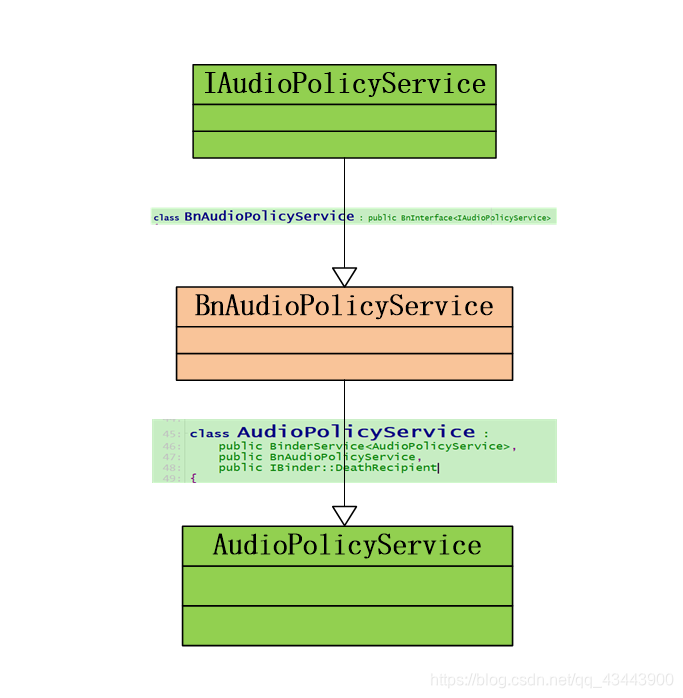回答这个问题前,首先找到是哪里调用了音频策略的选择设备的函数。
在前面分析中,可知道AUdioTrack的流程中——Android Audio:AudioTrack构造函数分析
有一个createTrack走到了音频策略选择。

PS:基于Android P源码分析,实习内容,分析不够准确,只供参考和自己学习。

frameworks\av\services\audioflinger\AudioFlinger.cpp
sp<IAudioTrack> AudioFlinger::createTrack(const CreateTrackInput& input,
CreateTrackOutput& output,
status_t *status)
{
sp<PlaybackThread::Track> track;
sp<TrackHandle> trackHandle;
sp<Client> client;
status_t lStatus;
audio_stream_type_t streamType;
audio_port_handle_t portId = AUDIO_PORT_HANDLE_NONE;
bool updatePid = (input.clientInfo.clientPid == -1);
const uid_t callingUid = IPCThreadState::self()->getCallingUid();
uid_t clientUid = input.clientInfo.clientUid;
if (!isTrustedCallingUid(callingUid)) {
ALOGW_IF(clientUid != callingUid,
"%s uid %d tried to pass itself off as %d",
__FUNCTION__, callingUid, clientUid);
clientUid = callingUid;
updatePid = true;
}
pid_t clientPid = input.clientInfo.clientPid;
if (updatePid) {
const pid_t callingPid = IPCThreadState::self()->getCallingPid();
ALOGW_IF(clientPid != -1 && clientPid != callingPid,
"%s uid %d pid %d tried to pass itself off as pid %d",
__func__, callingUid, callingPid, clientPid);
clientPid = callingPid;
}
audio_session_t sessionId = input.sessionId;
if (sessionId == AUDIO_SESSION_ALLOCATE) {
sessionId = (audio_session_t) newAudioUniqueId(AUDIO_UNIQUE_ID_USE_SESSION);
} else if (audio_unique_id_get_use(sessionId) != AUDIO_UNIQUE_ID_USE_SESSION) {
lStatus = BAD_VALUE;
goto Exit;
}
output.sessionId = sessionId;
output.outputId = AUDIO_IO_HANDLE_NONE;
output.selectedDeviceId = input.selectedDeviceId;
lStatus = AudioSystem::getOutputForAttr(&input.attr, &output.outputId, sessionId, &streamType,
clientPid, clientUid, &input.config, input.flags,
&output.selectedDeviceId, &portId);
if (lStatus != NO_ERROR || output.outputId == AUDIO_IO_HANDLE_NONE) {
ALOGE("createTrack() getOutputForAttr() return error %d or invalid output handle", lStatus);
goto Exit;
}
// client AudioTrack::set already implements AUDIO_STREAM_DEFAULT => AUDIO_STREAM_MUSIC,
// but if someone uses binder directly they could bypass that and cause us to crash
if (uint32_t(streamType) >= AUDIO_STREAM_CNT) {
ALOGE("createTrack() invalid stream type %d", streamType);
lStatus = BAD_VALUE;
goto Exit;
}
// further channel mask checks are performed by createTrack_l() depending on the thread type
if (!audio_is_output_channel(input.config.channel_mask)) {
ALOGE("createTrack() invalid channel mask %#x", input.config.channel_mask);
lStatus = BAD_VALUE;
goto Exit;
}
// further format checks are performed by createTrack_l() depending on the thread type
if ((!audio_is_valid_format(input.config.format)) &&
((property_get_bool("audio.aptx.aac_latm.decoder.enabled", false)) &&
(!(input.config.format == AUDIO_FORMAT_AAC_LATM_LC || input.config.format == AUDIO_FORMAT_APTX)))) {
ALOGE("createTrack() invalid format %#x", input.config.format);
lStatus = BAD_VALUE;
goto Exit;
}
{
Mutex::Autolock _l(mLock);
PlaybackThread *thread = checkPlaybackThread_l(output.outputId);
if (thread == NULL) {
ALOGE("no playback thread found for output handle %d", output.outputId);
lStatus = BAD_VALUE;
goto Exit;
}
client = registerPid(clientPid);
PlaybackThread *effectThread = NULL;
// check if an effect chain with the same session ID is present on another
// output thread and move it here.
for (size_t i = 0; i < mPlaybackThreads.size(); i++) {
sp<PlaybackThread> t = mPlaybackThreads.valueAt(i);
if (mPlaybackThreads.keyAt(i) != output.outputId) {
uint32_t sessions = t->hasAudioSession(sessionId);
if (sessions & ThreadBase::EFFECT_SESSION) {
effectThread = t.get();
break;
}
}
}
ALOGV("createTrack() sessionId: %d", sessionId);
output.sampleRate = input.config.sample_rate;
output.frameCount = input.frameCount;
output.notificationFrameCount = input.notificationFrameCount;
output.flags = input.flags;
track = thread->createTrack_l(client, streamType, input.attr, &output.sampleRate,
input.config.format, input.config.channel_mask,
&output.frameCount, &output.notificationFrameCount,
input.notificationsPerBuffer, input.speed,
input.sharedBuffer, sessionId, &output.flags,
input.clientInfo.clientTid, clientUid, &lStatus, portId);
LOG_ALWAYS_FATAL_IF((lStatus == NO_ERROR) && (track == 0));
// we don't abort yet if lStatus != NO_ERROR; there is still work to be done regardless
output.afFrameCount = thread->frameCount();
output.afSampleRate = thread->sampleRate();
output.afLatencyMs = thread->latency();
// move effect chain to this output thread if an effect on same session was waiting
// for a track to be created
if (lStatus == NO_ERROR && effectThread != NULL) {
// no risk of deadlock because AudioFlinger::mLock is held
Mutex::Autolock _dl(thread->mLock);
Mutex::Autolock _sl(effectThread->mLock);
moveEffectChain_l(sessionId, effectThread, thread, true);
}
// Look for sync events awaiting for a session to be used.
for (size_t i = 0; i < mPendingSyncEvents.size(); i++) {
if (mPendingSyncEvents[i]->triggerSession() == sessionId) {
if (thread->isValidSyncEvent(mPendingSyncEvents[i])) {
if (lStatus == NO_ERROR) {
(void) track->setSyncEvent(mPendingSyncEvents[i]);
} else {
mPendingSyncEvents[i]->cancel();
}
mPendingSyncEvents.removeAt(i);
i--;
}
}
}
setAudioHwSyncForSession_l(thread, sessionId);
}
if (lStatus != NO_ERROR) {
// remove local strong reference to Client before deleting the Track so that the
// Client destructor is called by the TrackBase destructor with mClientLock held
// Don't hold mClientLock when releasing the reference on the track as the
// destructor will acquire it.
{
Mutex::Autolock _cl(mClientLock);
client.clear();
}
track.clear();
goto Exit;
}
// return handle to client
trackHandle = new TrackHandle(track);
Exit:
if (lStatus != NO_ERROR && output.outputId != AUDIO_IO_HANDLE_NONE) {
AudioSystem::releaseOutput(output.outputId, streamType, sessionId);
}
*status = lStatus;
return trackHandle;
}
通过createTrack函数传入音轨输入输出的对象,通过AndioSystem来取得输出的属性,AndroidSustem在此处只是一个转发者。

frameworks\av\media\libaudioclient\AudioSystem.cpp
status_t AudioSystem::getOutputForAttr(const audio_attributes_t *attr,
audio_io_handle_t *output,
audio_session_t session,
audio_stream_type_t *stream,
pid_t pid,
uid_t uid,
const audio_config_t *config,
audio_output_flags_t flags,
audio_port_handle_t *selectedDeviceId,
audio_port_handle_t *portId)
{
const sp<IAudioPolicyService>& aps = AudioSystem::get_audio_policy_service();
if (aps == 0) return NO_INIT;
return aps->getOutputForAttr(attr, output, session, stream, pid, uid,
config,
flags, selectedDeviceId, portId);
}
通过Binder机制得到一个aps对象,然后走到aps中的getOutoutAttr中去,在此分析一下相互之间的关系。

这里主要就是通过Android binder机制来进行通信的,关于binder找了一篇比较浅显易懂的博客来进行大致的学习,毕竟深究binder源码机制对于我这种初学者有点困难:Android浅析Binder机制
在附上比较高级的binder讲解的博客:Android Binder设计与实现 - 设计篇

我们来接着看AudioPolicyService中的函数。
frameworks\av\services\audiopolicy\service\AudioPolicyInterfaceImpl.cpp
status_t AudioPolicyService::getOutputForAttr(const audio_attributes_t *attr,
audio_io_handle_t *output,
audio_session_t session,
audio_stream_type_t *stream,
pid_t pid,
uid_t uid,
const audio_config_t *config,
audio_output_flags_t flags,
audio_port_handle_t *selectedDeviceId,
audio_port_handle_t *portId)
{
if (mAudioPolicyManager == NULL) {
return NO_INIT;
}
ALOGV("getOutputForAttr()");
Mutex::Autolock _l(mLock);
const uid_t callingUid = IPCThreadState::self()->getCallingUid();
if (!isTrustedCallingUid(callingUid) || uid == (uid_t)-1) {
ALOGW_IF(uid != (uid_t)-1 && uid != callingUid,
"%s uid %d tried to pass itself off as %d", __FUNCTION__, callingUid, uid);
uid = callingUid;
}
audio_output_flags_t originalFlags = flags;
AutoCallerClear acc;
status_t result = mAudioPolicyManager->getOutputForAttr(attr, output, session, stream, uid,
config,
&flags, selectedDeviceId, portId);
// FIXME: Introduce a way to check for the the telephony device before opening the output
if ((result == NO_ERROR) &&
(flags & AUDIO_OUTPUT_FLAG_INCALL_MUSIC) &&
!modifyPhoneStateAllowed(pid, uid)) {
// If the app tries to play music through the telephony device and doesn't have permission
// the fallback to the default output device.
mAudioPolicyManager->releaseOutput(*output, *stream, session);
flags = originalFlags;
*selectedDeviceId = AUDIO_PORT_HANDLE_NONE;
*portId = AUDIO_PORT_HANDLE_NONE;
result = mAudioPolicyManager->getOutputForAttr(attr, output, session, stream, uid,
config,
&flags, selectedDeviceId, portId);
}
return result;
}
开头文件中包含AudioPolicyService.h,路径正确。

在该函数中,可看到将结果转给了mAudioPolicymanager对象去了。

看一下这个对象的由来。

frameworks\av\services\audiopolicy\managerdefault\AudioPolicyManager.h

因此最终是交给AudioPolicyManager来处理的。
frameworks\av\services\audiopolicy\managerdefault\AudioPolicyManager.cpp
status_t AudioPolicyManager::getOutputForAttr(const audio_attributes_t *attr,
audio_io_handle_t *output,
audio_session_t session,
audio_stream_type_t *stream,
uid_t uid,
const audio_config_t *config,
audio_output_flags_t *flags,
audio_port_handle_t *selectedDeviceId,
audio_port_handle_t *portId)
{
audio_attributes_t attributes;
if (attr != NULL) {
if (!isValidAttributes(attr)) {
ALOGE("getOutputForAttr() invalid attributes: usage=%d content=%d flags=0x%x tags=[%s]",
attr->usage, attr->content_type, attr->flags,
attr->tags);
return BAD_VALUE;
}
attributes = *attr;
} else {
if (*stream < AUDIO_STREAM_MIN || *stream >= AUDIO_STREAM_PUBLIC_CNT) {
ALOGE("getOutputForAttr(): invalid stream type");
return BAD_VALUE;
}
stream_type_to_audio_attributes(*stream, &attributes);
}
// TODO: check for existing client for this port ID
if (*portId == AUDIO_PORT_HANDLE_NONE) {
*portId = AudioPort::getNextUniqueId();
}
sp<SwAudioOutputDescriptor> desc;
if (mPolicyMixes.getOutputForAttr(attributes, uid, desc) == NO_ERROR) {
ALOG_ASSERT(desc != 0, "Invalid desc returned by getOutputForAttr");
if (!audio_has_proportional_frames(config->format)) {
return BAD_VALUE;
}
*stream = streamTypefromAttributesInt(&attributes);
*output = desc->mIoHandle;
ALOGV("getOutputForAttr() returns output %d", *output);
return NO_ERROR;
}
if (attributes.usage == AUDIO_USAGE_VIRTUAL_SOURCE) {
ALOGW("getOutputForAttr() no policy mix found for usage AUDIO_USAGE_VIRTUAL_SOURCE");
return BAD_VALUE;
}
ALOGV("getOutputForAttr() usage=%d, content=%d, tag=%s flags=%08x"
" session %d selectedDeviceId %d",
attributes.usage, attributes.content_type, attributes.tags, attributes.flags,
session, *selectedDeviceId);
*stream = streamTypefromAttributesInt(&attributes);
// Explicit routing?
sp<DeviceDescriptor> deviceDesc;
if (*selectedDeviceId != AUDIO_PORT_HANDLE_NONE) {
deviceDesc = mAvailableOutputDevices.getDeviceFromId(*selectedDeviceId);
}
mOutputRoutes.addRoute(session, *stream, SessionRoute::SOURCE_TYPE_NA, deviceDesc, uid);
routing_strategy strategy = (routing_strategy) getStrategyForAttr(&attributes);
audio_devices_t device = getDeviceForStrategy(strategy, false /*fromCache*/);
if ((attributes.flags & AUDIO_FLAG_HW_AV_SYNC) != 0) {
*flags = (audio_output_flags_t)(*flags | AUDIO_OUTPUT_FLAG_HW_AV_SYNC);
}
// Set incall music only if device was explicitly set, and fallback to the device which is
// chosen by the engine if not.
// FIXME: provide a more generic approach which is not device specific and move this back
// to getOutputForDevice.
if (device == AUDIO_DEVICE_OUT_TELEPHONY_TX &&
*stream == AUDIO_STREAM_MUSIC &&
audio_is_linear_pcm(config->format) &&
isInCall()) {
if (*selectedDeviceId != AUDIO_PORT_HANDLE_NONE) {
*flags = (audio_output_flags_t)AUDIO_OUTPUT_FLAG_INCALL_MUSIC;
} else {
device = mEngine->getDeviceForStrategy(strategy);
}
}
ALOGV("getOutputForAttr() device 0x%x, sampling rate %d, format %#x, channel mask %#x, "
"flags %#x",
device, config->sample_rate, config->format, config->channel_mask, *flags);
*output = getOutputForDevice(device, session, *stream, config, flags);
if (*output == AUDIO_IO_HANDLE_NONE) {
mOutputRoutes.removeRoute(session);
return INVALID_OPERATION;
}
DeviceVector outputDevices = mAvailableOutputDevices.getDevicesFromType(device);
*selectedDeviceId = outputDevices.size() > 0 ? outputDevices.itemAt(0)->getId()
: AUDIO_PORT_HANDLE_NONE;
ALOGV(" getOutputForAttr() returns output %d selectedDeviceId %d", *output, *selectedDeviceId);
return NO_ERROR;
}
这里面需要重点关注拿到设备前的两个函数。如何得到策略和通过策略选择设备。

首先看第一个函数。根据attr得到策略。
uint32_t AudioPolicyManager::getStrategyForAttr(const audio_attributes_t *attr) {
// flags to strategy mapping
if ((attr->flags & AUDIO_FLAG_BEACON) == AUDIO_FLAG_BEACON) {
return (uint32_t) STRATEGY_TRANSMITTED_THROUGH_SPEAKER;
}
if ((attr->flags & AUDIO_FLAG_AUDIBILITY_ENFORCED) == AUDIO_FLAG_AUDIBILITY_ENFORCED) {
return (uint32_t) STRATEGY_ENFORCED_AUDIBLE;
}
// usage to strategy mapping
return static_cast<uint32_t>(mEngine->getStrategyForUsage(attr->usage));
}
然后看第二个函数,分析设备是如何进行选择的。最后返回给了mEngine对象中 。
audio_devices_t AudioPolicyManager::getDeviceForStrategy(routing_strategy strategy,
bool fromCache)
{
// Check if an explicit routing request exists for a stream type corresponding to the
// specified strategy and use it in priority over default routing rules.
for (int stream = 0; stream < AUDIO_STREAM_FOR_POLICY_CNT; stream++) {
if (getStrategy((audio_stream_type_t)stream) == strategy) {
audio_devices_t forcedDevice =
mOutputRoutes.getActiveDeviceForStream(
(audio_stream_type_t)stream, mAvailableOutputDevices);
if (forcedDevice != AUDIO_DEVICE_NONE) {
return forcedDevice;
}
}
}
if (fromCache) {
ALOGVV("getDeviceForStrategy() from cache strategy %d, device %x",
strategy, mDeviceForStrategy[strategy]);
return mDeviceForStrategy[strategy];
}
return mEngine->getDeviceForStrategy(strategy);
}
frameworks\av\services\audiopolicy\enginedefault\src\Engine.cpp
可知返回了一个audio_devices_t的对象,操作选择在return的函数中。
audio_devices_t Engine::getDeviceForStrategy(routing_strategy strategy) const
{
DeviceVector availableOutputDevices = mApmObserver->getAvailableOutputDevices();
DeviceVector availableInputDevices = mApmObserver->getAvailableInputDevices();
const SwAudioOutputCollection &outputs = mApmObserver->getOutputs();
return getDeviceForStrategyInt(strategy, availableOutputDevices,
availableInputDevices, outputs, (uint32_t)AUDIO_DEVICE_NONE);
}
在此函数中,都是进行策略的选择,不同的策略得到不同的设备,主要是不同的策略的优先级的不同。比如从此函数来看,优先级最高的是SPEAKER.
audio_devices_t Engine::getDeviceForStrategyInt(routing_strategy strategy,
DeviceVector availableOutputDevices,
DeviceVector availableInputDevices,
const SwAudioOutputCollection &outputs,
uint32_t outputDeviceTypesToIgnore) const
{
uint32_t device = AUDIO_DEVICE_NONE;
uint32_t availableOutputDevicesType =
availableOutputDevices.types() & ~outputDeviceTypesToIgnore;
switch (strategy) {
case STRATEGY_TRANSMITTED_THROUGH_SPEAKER:
device = availableOutputDevicesType & AUDIO_DEVICE_OUT_SPEAKER;
break;
case STRATEGY_SONIFICATION_RESPECTFUL:
if (isInCall() || outputs.isStreamActiveLocally(AUDIO_STREAM_VOICE_CALL)) {
device = getDeviceForStrategyInt(
STRATEGY_SONIFICATION, availableOutputDevices, availableInputDevices, outputs,
outputDeviceTypesToIgnore);
} else {
bool media_active_locally =
outputs.isStreamActiveLocally(
AUDIO_STREAM_MUSIC, SONIFICATION_RESPECTFUL_AFTER_MUSIC_DELAY)
|| outputs.isStreamActiveLocally(
AUDIO_STREAM_ACCESSIBILITY, SONIFICATION_RESPECTFUL_AFTER_MUSIC_DELAY);
// routing is same as media without the "remote" device
device = getDeviceForStrategyInt(STRATEGY_MEDIA,
availableOutputDevices,
availableInputDevices, outputs,
AUDIO_DEVICE_OUT_REMOTE_SUBMIX | outputDeviceTypesToIgnore);
// if no media is playing on the device, check for mandatory use of "safe" speaker
// when media would have played on speaker, and the safe speaker path is available
if (!media_active_locally
&& (device & AUDIO_DEVICE_OUT_SPEAKER)
&& (availableOutputDevicesType & AUDIO_DEVICE_OUT_SPEAKER_SAFE)) {
device |= AUDIO_DEVICE_OUT_SPEAKER_SAFE;
device &= ~AUDIO_DEVICE_OUT_SPEAKER;
}
}
break;
case STRATEGY_DTMF:
if (!isInCall()) {
// when off call, DTMF strategy follows the same rules as MEDIA strategy
device = getDeviceForStrategyInt(
STRATEGY_MEDIA, availableOutputDevices, availableInputDevices, outputs,
outputDeviceTypesToIgnore);
break;
}
// when in call, DTMF and PHONE strategies follow the same rules
// FALL THROUGH
case STRATEGY_PHONE:
// Force use of only devices on primary output if:
// - in call AND
// - cannot route from voice call RX OR
// - audio HAL version is < 3.0 and TX device is on the primary HW module
if (getPhoneState() == AUDIO_MODE_IN_CALL) {
audio_devices_t txDevice = getDeviceForInputSource(AUDIO_SOURCE_VOICE_COMMUNICATION);
sp<AudioOutputDescriptor> primaryOutput = outputs.getPrimaryOutput();
audio_devices_t availPrimaryInputDevices =
availableInputDevices.getDevicesFromHwModule(primaryOutput->getModuleHandle());
// TODO: getPrimaryOutput return only devices from first module in
// audio_policy_configuration.xml, hearing aid is not there, but it's
// a primary device
// FIXME: this is not the right way of solving this problem
audio_devices_t availPrimaryOutputDevices =
(primaryOutput->supportedDevices() | AUDIO_DEVICE_OUT_HEARING_AID) &
availableOutputDevices.types();
if (((availableInputDevices.types() &
AUDIO_DEVICE_IN_TELEPHONY_RX & ~AUDIO_DEVICE_BIT_IN) == 0) ||
(((txDevice & availPrimaryInputDevices & ~AUDIO_DEVICE_BIT_IN) != 0) &&
(primaryOutput->getAudioPort()->getModuleVersionMajor() < 3))) {
availableOutputDevicesType = availPrimaryOutputDevices;
}
}
// for phone strategy, we first consider the forced use and then the available devices by
// order of priority
switch (mForceUse[AUDIO_POLICY_FORCE_FOR_COMMUNICATION]) {
case AUDIO_POLICY_FORCE_BT_SCO:
if (!isInCall() || strategy != STRATEGY_DTMF) {
device = availableOutputDevicesType & AUDIO_DEVICE_OUT_BLUETOOTH_SCO_CARKIT;
if (device) break;
}
device = availableOutputDevicesType & AUDIO_DEVICE_OUT_BLUETOOTH_SCO_HEADSET;
if (device) break;
device = availableOutputDevicesType & AUDIO_DEVICE_OUT_BLUETOOTH_SCO;
if (device) break;
// if SCO device is requested but no SCO device is available, fall back to default case
// FALL THROUGH
default: // FORCE_NONE
device = availableOutputDevicesType & AUDIO_DEVICE_OUT_HEARING_AID;
if (device) break;
// when not in a phone call, phone strategy should route STREAM_VOICE_CALL to A2DP
if (!isInCall() &&
(mForceUse[AUDIO_POLICY_FORCE_FOR_MEDIA] != AUDIO_POLICY_FORCE_NO_BT_A2DP) &&
(outputs.isA2dpOnPrimary() || (outputs.isA2dpSupported()))) {
device = availableOutputDevicesType & AUDIO_DEVICE_OUT_BLUETOOTH_A2DP;
if (device) break;
device = availableOutputDevicesType & AUDIO_DEVICE_OUT_BLUETOOTH_A2DP_HEADPHONES;
if (device) break;
}
device = availableOutputDevicesType & AUDIO_DEVICE_OUT_WIRED_HEADPHONE;
if (device) break;
device = availableOutputDevicesType & AUDIO_DEVICE_OUT_WIRED_HEADSET;
if (device) break;
device = availableOutputDevicesType & AUDIO_DEVICE_OUT_LINE;
if (device) break;
device = availableOutputDevicesType & AUDIO_DEVICE_OUT_USB_HEADSET;
if (device) break;
device = availableOutputDevicesType & AUDIO_DEVICE_OUT_USB_DEVICE;
if (device) break;
if (getDpConnAndAllowedForVoice() && isInCall()) {
device = availableOutputDevicesType & AUDIO_DEVICE_OUT_AUX_DIGITAL;
if (device) break;
}
if (!isInCall()) {
device = availableOutputDevicesType & AUDIO_DEVICE_OUT_USB_ACCESSORY;
if (device) break;
device = availableOutputDevicesType & AUDIO_DEVICE_OUT_DGTL_DOCK_HEADSET;
if (device) break;
device = availableOutputDevicesType & AUDIO_DEVICE_OUT_AUX_DIGITAL;
if (device) break;
device = availableOutputDevicesType & AUDIO_DEVICE_OUT_ANLG_DOCK_HEADSET;
if (device) break;
}
device = availableOutputDevicesType & AUDIO_DEVICE_OUT_EARPIECE;
break;
case AUDIO_POLICY_FORCE_SPEAKER:
// when not in a phone call, phone strategy should route STREAM_VOICE_CALL to
// A2DP speaker when forcing to speaker output
if (!isInCall() &&
(mForceUse[AUDIO_POLICY_FORCE_FOR_MEDIA] != AUDIO_POLICY_FORCE_NO_BT_A2DP) &&
(outputs.isA2dpOnPrimary() || (outputs.isA2dpSupported()))) {
device = availableOutputDevicesType & AUDIO_DEVICE_OUT_BLUETOOTH_A2DP_SPEAKER;
if (device) break;
}
if (!isInCall()) {
device = availableOutputDevicesType & AUDIO_DEVICE_OUT_USB_ACCESSORY;
if (device) break;
device = availableOutputDevicesType & AUDIO_DEVICE_OUT_USB_DEVICE;
if (device) break;
device = availableOutputDevicesType & AUDIO_DEVICE_OUT_DGTL_DOCK_HEADSET;
if (device) break;
device = availableOutputDevicesType & AUDIO_DEVICE_OUT_AUX_DIGITAL;
if (device) break;
device = availableOutputDevicesType & AUDIO_DEVICE_OUT_ANLG_DOCK_HEADSET;
if (device) break;
}
device = availableOutputDevicesType & AUDIO_DEVICE_OUT_SPEAKER;
break;
}
break;
case STRATEGY_SONIFICATION:
// If incall, just select the STRATEGY_PHONE device: The rest of the behavior is handled by
// handleIncallSonification().
if (isInCall() || outputs.isStreamActiveLocally(AUDIO_STREAM_VOICE_CALL)) {
device = getDeviceForStrategyInt(
STRATEGY_PHONE, availableOutputDevices, availableInputDevices, outputs,
outputDeviceTypesToIgnore);
break;
}
// FALL THROUGH
case STRATEGY_ENFORCED_AUDIBLE:
// strategy STRATEGY_ENFORCED_AUDIBLE uses same routing policy as STRATEGY_SONIFICATION
// except:
// - when in call where it doesn't default to STRATEGY_PHONE behavior
// - in countries where not enforced in which case it follows STRATEGY_MEDIA
if ((strategy == STRATEGY_SONIFICATION) ||
(mForceUse[AUDIO_POLICY_FORCE_FOR_SYSTEM] == AUDIO_POLICY_FORCE_SYSTEM_ENFORCED)) {
device = availableOutputDevicesType & AUDIO_DEVICE_OUT_SPEAKER;
}
// if SCO headset is connected and we are told to use it, play ringtone over
// speaker and BT SCO
if ((availableOutputDevicesType & AUDIO_DEVICE_OUT_ALL_SCO) != 0) {
uint32_t device2 = AUDIO_DEVICE_NONE;
device2 = availableOutputDevicesType & AUDIO_DEVICE_OUT_BLUETOOTH_SCO_CARKIT;
if (device2 == AUDIO_DEVICE_NONE) {
device2 = availableOutputDevicesType & AUDIO_DEVICE_OUT_BLUETOOTH_SCO_HEADSET;
}
if (device2 == AUDIO_DEVICE_NONE) {
device2 = availableOutputDevicesType & AUDIO_DEVICE_OUT_BLUETOOTH_SCO;
}
// Use ONLY Bluetooth SCO output when ringing in vibration mode
if (!((mForceUse[AUDIO_POLICY_FORCE_FOR_SYSTEM] == AUDIO_POLICY_FORCE_SYSTEM_ENFORCED)
&& (strategy == STRATEGY_ENFORCED_AUDIBLE))) {
if (mForceUse[AUDIO_POLICY_FORCE_FOR_VIBRATE_RINGING]
== AUDIO_POLICY_FORCE_BT_SCO) {
if (device2 != AUDIO_DEVICE_NONE) {
device = device2;
break;
}
}
}
// Use both Bluetooth SCO and phone default output when ringing in normal mode
if (mForceUse[AUDIO_POLICY_FORCE_FOR_COMMUNICATION] == AUDIO_POLICY_FORCE_BT_SCO) {
if ((strategy == STRATEGY_SONIFICATION) &&
(device & AUDIO_DEVICE_OUT_SPEAKER) &&
(availableOutputDevicesType & AUDIO_DEVICE_OUT_SPEAKER_SAFE)) {
device |= AUDIO_DEVICE_OUT_SPEAKER_SAFE;
device &= ~AUDIO_DEVICE_OUT_SPEAKER;
}
if (device2 != AUDIO_DEVICE_NONE) {
device |= device2;
break;
}
}
}
// if display-port is connected and being used in voice usecase,
// play ringtone over speaker and display-port
if ((strategy == STRATEGY_SONIFICATION) && getDpConnAndAllowedForVoice()) {
uint32_t device2 = availableOutputDevicesType & AUDIO_DEVICE_OUT_AUX_DIGITAL;
if (device2 != AUDIO_DEVICE_NONE) {
device |= device2;
break;
}
}
// The second device used for sonification is the same as the device used by media strategy
// FALL THROUGH
case STRATEGY_ACCESSIBILITY:
if (strategy == STRATEGY_ACCESSIBILITY) {
// do not route accessibility prompts to a digital output currently configured with a
// compressed format as they would likely not be mixed and dropped.
for (size_t i = 0; i < outputs.size(); i++) {
sp<AudioOutputDescriptor> desc = outputs.valueAt(i);
audio_devices_t devices = desc->device() &
(AUDIO_DEVICE_OUT_HDMI | AUDIO_DEVICE_OUT_SPDIF | AUDIO_DEVICE_OUT_HDMI_ARC);
if (desc->isActive() && !audio_is_linear_pcm(desc->mFormat) &&
devices != AUDIO_DEVICE_NONE) {
availableOutputDevicesType = availableOutputDevices.types() & ~devices;
}
}
availableOutputDevices =
availableOutputDevices.getDevicesFromType(availableOutputDevicesType);
if (outputs.isStreamActive(AUDIO_STREAM_RING) ||
outputs.isStreamActive(AUDIO_STREAM_ALARM)) {
return getDeviceForStrategyInt(
STRATEGY_SONIFICATION, availableOutputDevices, availableInputDevices, outputs,
outputDeviceTypesToIgnore);
}
if (isInCall()) {
return getDeviceForStrategyInt(
STRATEGY_PHONE, availableOutputDevices, availableInputDevices, outputs,
outputDeviceTypesToIgnore);
}
}
// For other cases, STRATEGY_ACCESSIBILITY behaves like STRATEGY_MEDIA
// FALL THROUGH
// FIXME: STRATEGY_REROUTING follow STRATEGY_MEDIA for now
case STRATEGY_REROUTING:
case STRATEGY_MEDIA: {
uint32_t device2 = AUDIO_DEVICE_NONE;
if (isInCall() && (device == AUDIO_DEVICE_NONE)) {
// when in call, get the device for Phone strategy
device = getDeviceForStrategy(STRATEGY_PHONE);
break;
}
if (strategy != STRATEGY_SONIFICATION) {
// no sonification on remote submix (e.g. WFD)
if (availableOutputDevices.getDevice(AUDIO_DEVICE_OUT_REMOTE_SUBMIX,
String8("0")) != 0) {
device2 = availableOutputDevices.types() & AUDIO_DEVICE_OUT_REMOTE_SUBMIX;
}
}
if (isInCall() && (strategy == STRATEGY_MEDIA)) {
device = getDeviceForStrategyInt(
STRATEGY_PHONE, availableOutputDevices, availableInputDevices, outputs,
outputDeviceTypesToIgnore);
break;
}
if (device2 == AUDIO_DEVICE_NONE) {
device2 = availableOutputDevicesType & AUDIO_DEVICE_OUT_HEARING_AID;
}
if ((device2 == AUDIO_DEVICE_NONE) &&
(mForceUse[AUDIO_POLICY_FORCE_FOR_MEDIA] != AUDIO_POLICY_FORCE_NO_BT_A2DP) &&
(outputs.isA2dpOnPrimary() || (outputs.isA2dpSupported()))) {
device2 = availableOutputDevicesType & AUDIO_DEVICE_OUT_BLUETOOTH_A2DP;
if (device2 == AUDIO_DEVICE_NONE) {
device2 = availableOutputDevicesType & AUDIO_DEVICE_OUT_BLUETOOTH_A2DP_HEADPHONES;
}
if (device2 == AUDIO_DEVICE_NONE) {
device2 = availableOutputDevicesType & AUDIO_DEVICE_OUT_BLUETOOTH_A2DP_SPEAKER;
}
}
if ((device2 == AUDIO_DEVICE_NONE) &&
(mForceUse[AUDIO_POLICY_FORCE_FOR_MEDIA] == AUDIO_POLICY_FORCE_SPEAKER)) {
device2 = availableOutputDevicesType & AUDIO_DEVICE_OUT_SPEAKER;
}
if (device2 == AUDIO_DEVICE_NONE) {
device2 = availableOutputDevicesType & AUDIO_DEVICE_OUT_WIRED_HEADPHONE;
}
if (device2 == AUDIO_DEVICE_NONE) {
device2 = availableOutputDevicesType & AUDIO_DEVICE_OUT_LINE;
}
if (device2 == AUDIO_DEVICE_NONE) {
device2 = availableOutputDevicesType & AUDIO_DEVICE_OUT_WIRED_HEADSET;
}
if (device2 == AUDIO_DEVICE_NONE) {
device2 = availableOutputDevicesType & AUDIO_DEVICE_OUT_USB_HEADSET;
}
if (device2 == AUDIO_DEVICE_NONE) {
device2 = availableOutputDevicesType & AUDIO_DEVICE_OUT_USB_ACCESSORY;
}
if (device2 == AUDIO_DEVICE_NONE) {
device2 = availableOutputDevicesType & AUDIO_DEVICE_OUT_USB_DEVICE;
}
if (device2 == AUDIO_DEVICE_NONE) {
device2 = availableOutputDevicesType & AUDIO_DEVICE_OUT_DGTL_DOCK_HEADSET;
}
if ((device2 == AUDIO_DEVICE_NONE) && (strategy != STRATEGY_SONIFICATION) &&
(device == AUDIO_DEVICE_NONE)) {
// no sonification on aux digital (e.g. HDMI)
device2 = availableOutputDevicesType & AUDIO_DEVICE_OUT_AUX_DIGITAL;
}
if ((device2 == AUDIO_DEVICE_NONE) && (strategy != STRATEGY_SONIFICATION) &&
(mForceUse[AUDIO_POLICY_FORCE_FOR_DOCK] == AUDIO_POLICY_FORCE_ANALOG_DOCK)) {
device2 = availableOutputDevicesType & AUDIO_DEVICE_OUT_ANLG_DOCK_HEADSET;
}
if ((device2 == AUDIO_DEVICE_NONE) && (strategy != STRATEGY_SONIFICATION) &&
(device == AUDIO_DEVICE_NONE)) {
// no sonification on WFD sink
device2 = availableOutputDevicesType & AUDIO_DEVICE_OUT_PROXY;
}
if (device2 == AUDIO_DEVICE_NONE) {
device2 = availableOutputDevicesType & AUDIO_DEVICE_OUT_SPEAKER;
}
int device3 = AUDIO_DEVICE_NONE;
if (strategy == STRATEGY_MEDIA) {
// ARC, SPDIF and AUX_LINE can co-exist with others.
device3 = availableOutputDevicesType & AUDIO_DEVICE_OUT_HDMI_ARC;
device3 |= (availableOutputDevicesType & AUDIO_DEVICE_OUT_SPDIF);
device3 |= (availableOutputDevicesType & AUDIO_DEVICE_OUT_AUX_LINE);
}
device2 |= device3;
// device is DEVICE_OUT_SPEAKER if we come from case STRATEGY_SONIFICATION or
// STRATEGY_ENFORCED_AUDIBLE, AUDIO_DEVICE_NONE otherwise
device |= device2;
// If hdmi system audio mode is on, remove speaker out of output list.
if ((strategy == STRATEGY_MEDIA) &&
(mForceUse[AUDIO_POLICY_FORCE_FOR_HDMI_SYSTEM_AUDIO] ==
AUDIO_POLICY_FORCE_HDMI_SYSTEM_AUDIO_ENFORCED)) {
device &= ~AUDIO_DEVICE_OUT_SPEAKER;
}
// for STRATEGY_SONIFICATION:
// if SPEAKER was selected, and SPEAKER_SAFE is available, use SPEAKER_SAFE instead
if ((strategy == STRATEGY_SONIFICATION) &&
(device & AUDIO_DEVICE_OUT_SPEAKER) &&
(availableOutputDevicesType & AUDIO_DEVICE_OUT_SPEAKER_SAFE)) {
device |= AUDIO_DEVICE_OUT_SPEAKER_SAFE;
device &= ~AUDIO_DEVICE_OUT_SPEAKER;
}
} break;
default:
ALOGW("getDeviceForStrategy() unknown strategy: %d", strategy);
break;
}
if (device == AUDIO_DEVICE_NONE) {
ALOGV("getDeviceForStrategy() no device found for strategy %d", strategy);
device = mApmObserver->getDefaultOutputDevice()->type();
ALOGE_IF(device == AUDIO_DEVICE_NONE,
"getDeviceForStrategy() no default device defined");
}
ALOGVV("getDeviceForStrategy() strategy %d, device %x", strategy, device);
return device;
}

ps:前面IAudioPolicyService.cpp的binder机制在此处可记录一笔:
frameworks\av\media\libaudioclient\IAudioPolicyService.cpp

转到onTransact()中进行选择。

